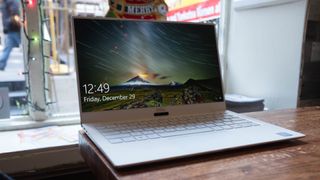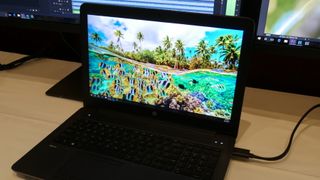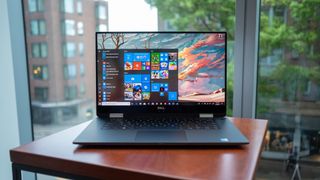4K on laptops: is it worth it?
4K or not 4K – that is the question…

If you’re buying a new notebook, you may be pondering whether it makes sense to get one with a 4K screen. Increasingly, there are more of these laptops around – but are manufacturers pushing these machines as premium profit-churning products, with the benefit of 4K being questionable in some cases? Or is upping your game to 4K really worth doing?
As you might have guessed, there’s no straightforward single answer to this pretty broad question. A good deal depends on the kind of laptop you’re buying, and what you’re intending to use that portable for, so we’ll focus on considering those aspects in our discussion of the merits (or lack thereof) of 4K displays.
Size matters
4K is a very high resolution, cramming 3,840 x 2,160 pixels into the display. If you’re buying a smaller laptop, with a more compact screen, there’s certainly an argument that 4K provides diminishing returns. In other words, the smaller the screen, the less noticeable the improvement when you jack up the resolution.
That’s certainly true to a point, and there are those who would argue that 4K on a smaller – say 13-inch – laptop probably isn’t worth it (and certainly not on anything smaller than that). However, it’s not quite as simple as that, and some folks would argue otherwise because you’re often sat pretty close to a laptop screen, so any difference can potentially be more noticeable.
But, it’s definitely worth bearing in mind that there’s certainly a diminishing returns factor as you scale the screen down. However, as mentioned, this is something of a subjective matter, so it’s a great idea – particularly if you’re paying a lot of money for a laptop – to try to see the screen in action yourself if at all possible (head to your local retailer, for example).

Don’t be dazzled
Another important point is not to be dazzled into thinking 4K is the be-all and end-all of image quality. Far from it. Aside from resolution, there are plenty of other factors that make a good display. Vivid colors (and indeed color accuracy) and punchy contrast, brightness levels, wide viewing angles, and the overall panel quality are all very important considerations.
It’s quite possible to have a Full HD display that delivers in all these mentioned areas, and looks better than a 4K screen. The 4K screen may still look sharper and pick out more detail, but it simply won’t look as good, and the overall picture quality is what’s important.
Get daily insight, inspiration and deals in your inbox
Get the hottest deals available in your inbox plus news, reviews, opinion, analysis and more from the TechRadar team.
That said, if you get a 4K display which also delivers in terms of color, contrast and so forth, it can provide a gobsmacking viewing experience. Depending on what you’ll use the laptop for, 4K is very useful for those who really need super-accurate image quality for their creative photography or video work, for example.
And naturally, it’s also great for those who want to watch 4K movies, or play games in 4K, with some seriously jaw-dropping entertainment experiences available in that respect. 4K content used to be thin on the ground, but there’s now a good deal more around in terms of films or shows, and games, which support the resolution.

Pixel pushing
If you’re purchasing a 4K laptop with gaming in mind, there are some seriously eye candy-laden titles that may blow your mind, but could equally be a serious blow to your GPU. Remember, the notebook has to deal with 3,840 x 2,160 pixels, which is a lot more work than 1,920 x 1,080, and puts a serious strain on the graphics card.
In other words, you’ll need a seriously powerful laptop with a very beefy GPU to deal with 4K gaming – at least if you want to play contemporary games (and even the less demanding ones will still need a good bit of oomph to run decently at 4K). You’ll likely need to go easy on the game’s graphics detail settings, too (amp them up in combination with a high resolution and you’ve got a potential recipe for stuttering disaster).
And even then, if your game is running at a decent frame rate, you may not be able to escape the thought in the back of your mind that if you were on a lower resolution, the action would be running even smoother. Sometimes, particularly in competitive multiplayer titles, having the frame rate super-smooth so you can aim better is much more important than being able to pick out the likes of details on guns or in shadows.
That’s why more competitive gamers often swerve a 4K laptop panel in favor of a lower resolution (1440p or even 1080p), perhaps with a higher refresh rate of 120Hz or 144Hz allowing for higher (smoother) frame rates.
Don’t forget that a 4K screen will also sap more battery than a display with fewer pixels, and particularly with gaming laptops, battery longevity can be a hard enough battle as it is.

Cost considerations
Finally, a further downside is that a laptop with a 4K screen will almost certainly be a good deal more expensive than one with a lesser resolution. You can see this clearly illustrated in laptops where a 4K display is an option, because when you add it via the notebook configurator, you’ll doubtless see the price of the portable shoot up.
So, all things considered, the case against 4K seems to stack up, so our advice would be to proceed with caution when considering a notebook which runs with such a display. That said, in the right circumstances, for the right purpose, 4K can certainly make sense if you don’t mind paying the premium.
And even with all the potential downsides, when you sit in front of a really good 4K display, whatever you’re looking at is an absolute joy to behold (even the Windows 10 desktop, now that the OS handles scaling UI text and icons more adeptly these days).
On a final note, we'd like to reiterate that making the leap to 4K is often going to be something of a subjective decision, so we’d again urge you to go try out some (different-sized) 4K notebooks at a shop if at all possible.
- Check out our picks of the best 4K laptops money can buy
Darren is a freelancer writing news and features for TechRadar (and occasionally T3) across a broad range of computing topics including CPUs, GPUs, various other hardware, VPNs, antivirus and more. He has written about tech for the best part of three decades, and writes books in his spare time (his debut novel - 'I Know What You Did Last Supper' - was published by Hachette UK in 2013).
